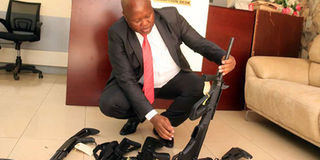Fred Matiang'i strives to clean rot in gun industry

Firearms Licensing Board Chairman Charles Mukindia displays some of the guns confiscated from civilians during the ongoing vetting, on February 20, 2019 in Nairobi. PHOTO | JEFF ANGOTE | NATION MEDIA GROUP
What you need to know:
- A source said that some former board members had commercial interest in some of the firms licensed to sell guns.
- Although there was an elaborate vetting which was to be done before the certificate was issued, OCSs did not have a checklist of what to ask applicants.
Private gun ownership licensing has been so badly run, that with Sh300,000 you could get a permit without any due diligence.
And now, civilian gun owners in Nairobi have been given up to March 7 to return the firearms for scrutiny and vetting as Interior Cabinet Secretary Fred Matiang'i attempts to regulate the industry — infiltrated by cartels and brokers.
“We won’t extend the deadline and we shall take legal measures against those who do not turn up for vetting,” Dr Matiang’i said about the ongoing exercise, adding: “All private firearm holders in the country must be registered afresh by March 18.”
Already, the Firearm Licensing and Control Board has developed a microchip card that will have all the details of a firearm holder and which will replace the age-old certificate introduced in the 1950s.
So shady was the licensing, previously run by police, that the country did not even have a credible gun register.
COMPLICIT
To get a certificate, an applicant was only supposed to appear before a local Officer Commanding Station (OCS), who would recommend the issuance of a licence to keep the firearm.
The application would then be taken to the Regional Commander who would endorse the application without questioning the applicant. Finally, the Firearms Licensing Board would rubber-stamp the approval.
It has now emerged — and the ministry has said as much — that previous board members worked in cahoots with dealers who were licensed to sell firearms and ammunitions.
“We have found that there were so many guns in the wrong hands. People were purchasing guns to show off,” Firearm Licensing Board chairman Charles Mukindia said.
Once a dealer imported firearms, they would use some board members to recommend where to purchase the guns.
REVOKED
A source close to the ongoing investigations told Nation that some former board members had commercial interest in some of the firms licensed to sell guns.
"Unless you bought your gun from some of the dealers where board members had an interest, they would delay your gun licence. The board was simply in the business of selling guns," a source said.
By last week, the vetting team had revoked 35 certificates and confiscated 224 assorted firearms.
Ministry officials said that the gun owners were innocent parties caught between gun dealers and cartels that had infiltrated the industry.
The most shocking find was a gun owner who also had a chemical mace — a tear gas spray gun that had been sold to him.
While this type of weapon should not be in the hands of civilians, two of such guns had been seized by last week.
“There is no way a civilian would know the type of guns allowed by the law,” the source added.
VETTING
While a firearm certificate allowed a person to hold one firearm, the system had a loophole which allowed for the variation of the certificate.
This gave the dealers a chance to market their new acquisitions to gun owners and to collude with the board to approve the holding of extra firearms.
Although there was an elaborate vetting which was to be done before the certificate was issued, OCSs did not have a checklist of what to ask applicants.
Also, the licensing had been left to highly trained officers who had over the years been trusted to run the exercise.
But some of those issued with certificates did not show up for the mandatory training on how to handle the weapons, meaning they did not know how to handle them.
“This was akin to having a car and a driving licence when you can’t drive,” Mr Mukindia said.
More so, there were owners who did not have safes as required by law.
REVAMP
Last year, Dr Matiang’i disbanded the Firearms Licensing and Control Board in order to establish a digital registry of licensed firearm holders after it emerged that power brokers and civilians were holding military-type weapons.
Although the National Gun Owners Association of Kenya had gone to court to stop the exercise, Dr Matiang’i told a meeting in Mombasa last month that anyone found without the biometric card will be prosecuted.
Without a gun register, Dr Matiang’i, it had become difficult to trace guns used in crimes.
“Police commanders know the pinch we have felt. We have been collecting cartridges but gun tracing has been difficult,” he said.




